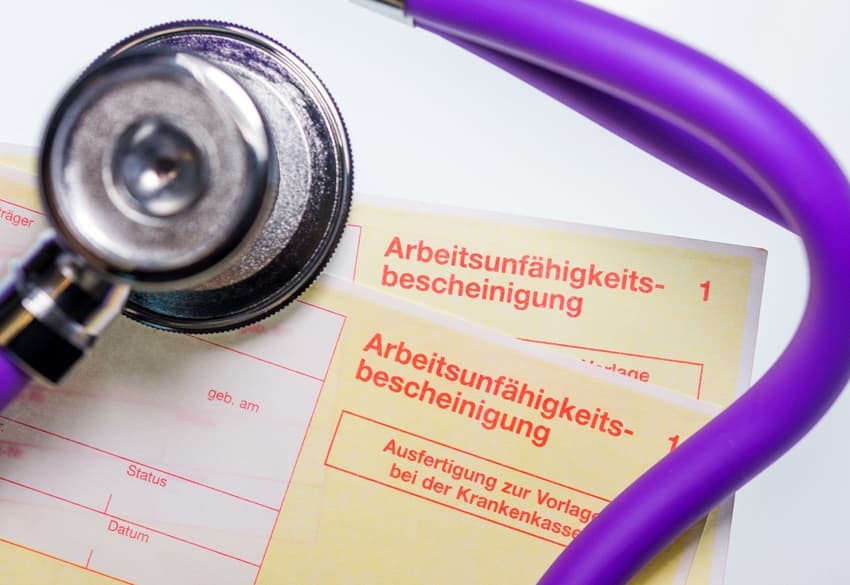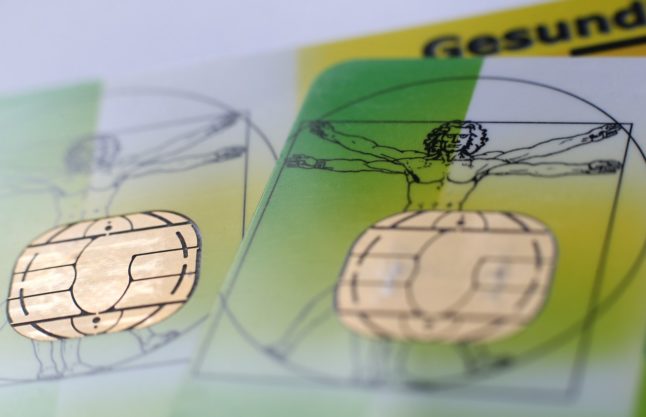EXPLAINED: What happens if you’re off sick for a long time in Germany

Compared to many other countries, German health and social insurance is set up so that long absences from work due to sickness need not leave you in financial ruin. But there are a few complexities to know about.
It’s something out of many of our worst fears – the possibility that we might get sick for a long period of time.
In addition to the stress of fighting whatever illness has us off work, there’s the worry about what it might mean financially or for our jobs.
In Germany, Krankengeld, literally “sick money” or “sick pay” – is designed to at least mitigate financial concerns, so you can focus on getting better.
When is Krankengeld paid out?
If you’re off sick in Germany, you’ll need a sick note from your doctor if you’re off for longer than three business days in a row. Your doctor will typically make a copy for you, your employer, and your health insurance fund – or Krankenkasse.
If you’re off sick for up to six weeks, your employer will typically continue to pay you your full salary – no matter what kind of health insurance you have. If your illness lasts longer than that, your employer can stop paying your salary. However, this is also the point where your Krankenkasse takes over and begins paying you sick pay – or Krankengeld. This is designed to make sure that neither you nor your employer are on the hook for the costs of you being off sick for a longer term.
READ ALSO: Working in Germany: The 10 rules you need to know if you fall ill
How much Krankengeld do I get and how long does it last?
Once you’re off for longer than six weeks, any sickness benefit you get varies depending on what kind of health insurance you have.
Public health insurance funds – or gesetzliche Krankenkassen – like AoK or TK will pay you 70 percent of your gross salary, up to a maximum of either 90 percent of your net salary or €116.88 per day, including weekends and public holidays. Any one-off payments like Christmas bonuses are also taken into account.
Your eligibility for Krankengeld starts from the 43rd day of you being off sick, as your doctor documents in your sick note. Your Krankenkasse has to compensate you with back payments if necessary.

Health insurance cards from statutory insurer AOK. German health insurance will pay your medical bills, including sick pay for up to 78 weeks. Photo: picture alliance/dpa | Karl-Josef Hildenbrand
You remain eligible for Krankengeld for up to 78 weeks – or a year and a half – out of every three years. This does mean that if you exceed your 78 weeks in the same three years, you won’t be eligible for Krankengeld, even if you’re off for a different illness.
Some private insurance companies may offer you a Verdienstausfall benefit – which covers the difference between your regular salary and your Krankengeld payments – as only a portion of your regular salary is covered. These benefits typically cost a bit extra.
Private health insurance plans may have wildly different plans for Krankengeld. Some may not offer it at all, while others may have added benefits. This depends on your individual insurer and policy, so take care to read the fine print.
If you’ve become injured or ill as a direct result of performing your workplace duties, your employer’s insurance will typically cover associated costs, so Krankengeld may also be managed differently in that case.
READ ALSO: EXPLAINED: How Germany’s new electronic sick note works
What if I’m a student, self-employed, on an apprenticeship, or unemployed?
Apprentices and the unemployed in Germany are entitled to Krankengeld. Students who work more than 20 hours a week may also be entitled to Krankengeld, as their main occupation is their job rather than studies. Students who work less than 20 hours a week are generally not entitled to Krankengeld.
The self-employed are obviously at a greater risk of financial complications due to sickness in Germany, as there is no employer to pay their salaries if they get sick. But the self-employed can typically purchase extra protection for themselves.
Firstly, all people on public health insurance are entitled to Krankengeld from day 43 – or after six weeks – of being off sick. This applies to the self-employed the same way as it does to those working for someone.

Self-employed people in Germany can still get sick pay. Photo: Pixabay.
Public health insurances like AoK and TK have additional Krankengeld plans that only the self-employed can opt into.
For about an extra 0.6 percent of a self-employed person’s income, that person can gain eligibility for Krankengeld from the 22nd day – or three weeks – of being off sick, cutting their wait time for sick pay in half.
People in artistic professions who are members of the artists' social insurance fund, or Kunstlersozialkasse (KSK), can pay 0.8 percent extra of their income to receive eligibility for sick pay from the 15th day that they’re off sick.
In considering how much Krankengeld a self-employed person is eligible for, health insurance funds will typically look at your income over the last twelve months.
READ ALSO: How to make the most of reward schemes on your German health insurance
What caveats are there?
If you’re collecting Krankengeld, you’re expected to be recovering. While travel within Germany is allowed, your health insurance fund may suspend your payments if you travel abroad without first clearing it with them.
You also won’t generally have to pay your public insurer the usual fees while you’re off sick, but you’ll still have to pay any necessary taxes and contributions to your pension.
Lastly, Krankengeld is not paid out beyond 78 weeks in every three years. So you won’t have longer term coverage if you become completely unable to work. If that happens, you can apply to take out your pension – provided you’ve been working in Germany and paying pension contributions for at least five years. There will also be other types of welfare payments available, such as long-term unemployment and disability benefit.

A man sits at a table and counts money. The government is offering significant subsidies for home owners who need to exchange their heating systems. Photo: picture alliance/dpa | Hauke-Christian Dittrich
Some private insurance companies also offer Berufsunfähigkeitversicherung, which replaces the income of someone who becomes completely unable to practice their profession. People in higher-risk professions like builders or doctors may have this type of insurance. If they become unable to work anymore, this insurance will pay out their salaries until they reach retirement age.
This type of insurance though, can be expensive. It’s difficult to get a premium for less that about €25 a month, and the income replacement rates are very low. Policies with higher payout rates in the event of being unable to work anymore can run you over €100 per month.
READ ALSO: EXPLAINED: Which German insurance do you need for accidents?
Comments
See Also
It’s something out of many of our worst fears – the possibility that we might get sick for a long period of time.
In addition to the stress of fighting whatever illness has us off work, there’s the worry about what it might mean financially or for our jobs.
In Germany, Krankengeld, literally “sick money” or “sick pay” – is designed to at least mitigate financial concerns, so you can focus on getting better.
When is Krankengeld paid out?
If you’re off sick in Germany, you’ll need a sick note from your doctor if you’re off for longer than three business days in a row. Your doctor will typically make a copy for you, your employer, and your health insurance fund – or Krankenkasse.
If you’re off sick for up to six weeks, your employer will typically continue to pay you your full salary – no matter what kind of health insurance you have. If your illness lasts longer than that, your employer can stop paying your salary. However, this is also the point where your Krankenkasse takes over and begins paying you sick pay – or Krankengeld. This is designed to make sure that neither you nor your employer are on the hook for the costs of you being off sick for a longer term.
READ ALSO: Working in Germany: The 10 rules you need to know if you fall ill
How much Krankengeld do I get and how long does it last?
Once you’re off for longer than six weeks, any sickness benefit you get varies depending on what kind of health insurance you have.
Public health insurance funds – or gesetzliche Krankenkassen – like AoK or TK will pay you 70 percent of your gross salary, up to a maximum of either 90 percent of your net salary or €116.88 per day, including weekends and public holidays. Any one-off payments like Christmas bonuses are also taken into account.
Your eligibility for Krankengeld starts from the 43rd day of you being off sick, as your doctor documents in your sick note. Your Krankenkasse has to compensate you with back payments if necessary.

You remain eligible for Krankengeld for up to 78 weeks – or a year and a half – out of every three years. This does mean that if you exceed your 78 weeks in the same three years, you won’t be eligible for Krankengeld, even if you’re off for a different illness.
Some private insurance companies may offer you a Verdienstausfall benefit – which covers the difference between your regular salary and your Krankengeld payments – as only a portion of your regular salary is covered. These benefits typically cost a bit extra.
Private health insurance plans may have wildly different plans for Krankengeld. Some may not offer it at all, while others may have added benefits. This depends on your individual insurer and policy, so take care to read the fine print.
If you’ve become injured or ill as a direct result of performing your workplace duties, your employer’s insurance will typically cover associated costs, so Krankengeld may also be managed differently in that case.
READ ALSO: EXPLAINED: How Germany’s new electronic sick note works
What if I’m a student, self-employed, on an apprenticeship, or unemployed?
Apprentices and the unemployed in Germany are entitled to Krankengeld. Students who work more than 20 hours a week may also be entitled to Krankengeld, as their main occupation is their job rather than studies. Students who work less than 20 hours a week are generally not entitled to Krankengeld.
The self-employed are obviously at a greater risk of financial complications due to sickness in Germany, as there is no employer to pay their salaries if they get sick. But the self-employed can typically purchase extra protection for themselves.
Firstly, all people on public health insurance are entitled to Krankengeld from day 43 – or after six weeks – of being off sick. This applies to the self-employed the same way as it does to those working for someone.

Public health insurances like AoK and TK have additional Krankengeld plans that only the self-employed can opt into.
For about an extra 0.6 percent of a self-employed person’s income, that person can gain eligibility for Krankengeld from the 22nd day – or three weeks – of being off sick, cutting their wait time for sick pay in half.
People in artistic professions who are members of the artists' social insurance fund, or Kunstlersozialkasse (KSK), can pay 0.8 percent extra of their income to receive eligibility for sick pay from the 15th day that they’re off sick.
In considering how much Krankengeld a self-employed person is eligible for, health insurance funds will typically look at your income over the last twelve months.
READ ALSO: How to make the most of reward schemes on your German health insurance
What caveats are there?
If you’re collecting Krankengeld, you’re expected to be recovering. While travel within Germany is allowed, your health insurance fund may suspend your payments if you travel abroad without first clearing it with them.
You also won’t generally have to pay your public insurer the usual fees while you’re off sick, but you’ll still have to pay any necessary taxes and contributions to your pension.
Lastly, Krankengeld is not paid out beyond 78 weeks in every three years. So you won’t have longer term coverage if you become completely unable to work. If that happens, you can apply to take out your pension – provided you’ve been working in Germany and paying pension contributions for at least five years. There will also be other types of welfare payments available, such as long-term unemployment and disability benefit.

Some private insurance companies also offer Berufsunfähigkeitversicherung, which replaces the income of someone who becomes completely unable to practice their profession. People in higher-risk professions like builders or doctors may have this type of insurance. If they become unable to work anymore, this insurance will pay out their salaries until they reach retirement age.
This type of insurance though, can be expensive. It’s difficult to get a premium for less that about €25 a month, and the income replacement rates are very low. Policies with higher payout rates in the event of being unable to work anymore can run you over €100 per month.
READ ALSO: EXPLAINED: Which German insurance do you need for accidents?
Join the conversation in our comments section below. Share your own views and experience and if you have a question or suggestion for our journalists then email us at [email protected].
Please keep comments civil, constructive and on topic – and make sure to read our terms of use before getting involved.
Please log in here to leave a comment.